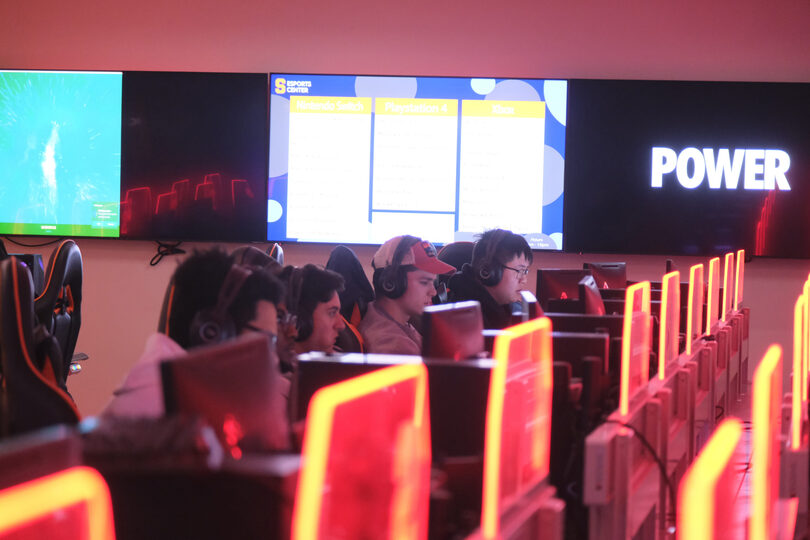SU helps expand competitive gaming landscape with Power Esports Conference

SU has helped revitalize the college esports market with the new Power Esports Conference, where schools compete in numerous video games. Maxine Brackbill | Daily Orange File Photo
Get the latest Syracuse news delivered right to your inbox. Subscribe to our sports newsletter here.
Esports is taking a natural step with the creation of college leagues. While they weren’t sponsored by the NCAA, there have been leagues at the collegiate level since 2009.
Recently, Syracuse, Michigan State and Boise State realized there was a void in the market. While there were many schools and leagues competing independently, there wasn’t a prominent, recognizable esports league in college athletics.
Now, that problem may be solved with the Power Esports Conference. Formed last year, the PEC includes nine teams — all Division I schools in the power four conferences — including Syracuse. It runs leagues in four games: Valorant, Overwatch, Super Smash Bros and Rocket League. Now in its second season, the PEC hopes to change the way esports is run and how people view it.
“We saw a huge need for competition tailored for large (Division I), Power Four schools in collegiate esports,” SU Esports Competition Director Travis Yang said.
Establishing the new conference came with challenges, though. Syracuse esports director Joey Gawrysiak wanted to set up the league on as small a budget as possible, which meant figuring out how to divvy up tasks on a shoestring budget.
The low budget, due to the NCAA’s decision to vote against sponsoring esports in 2019, does prevent the PEC from doing some things, Gawrysiak added. That includes hiring people to build a website or organizing tournaments.
The PEC originally started with eight teams: Ohio State, Missouri, Kansas, USC, Nebraska, on top of SU, Boise State and Michigan State. Entering the second season, it now features nine squads after adding Minnesota and replacing USC and Missouri with Baylor and Utah.
“We lost two members after last season, but the way we look at it is that since we gained three teams, we are up one for the new year,” Yang said.
The league gives schools the marketing opportunity that esports has lacked previously, as it presents schools with the chance to play programs people recognize instead of smaller esports powerhouses.
Just pay attention and watch a match. When people do that, they will see how skilled our student-athletes are.Joey Gawrysiak, Syracuse esports director
Yang mentioned the new schedule, featuring teams like Utah and Michigan State, improves the PEC’s marketability. Gawrysiak said it’s especially important because it rekindles rivalries from other sports, like Syracuse and Michigan State’s basketball rivalry.
“While it’s going to be really cool to someone in the esports world when we beat a team like Fisher College or Maryville, you tell that to an administrator, they don’t have that reaction,” Syracuse esports coordinator Rob Henick said.
Unlike other esports leagues, the PEC organizes its schedule by the four games, or titles, it offers. While most esports schedules are haphazard, with matches occurring on any day of the week, the PEC’s is organized so that one school plays all four titles against the same school in one week, then does the same against another program in the next.
The PEC’s season consists of seven matchups in both the fall and spring. Those matchups are purely for seeding purposes, as all nine teams qualify for the playoffs in Las Vegas. Last season, Syracuse earned the No. 2 seed in Overwatch, while finishing as low as fifth in the standings in each of the other titles.
Boise State claimed the title in Rocket League and Overwatch, while Michigan State claimed the Valorant and Super Smash Bros titles. Yang believes the tournament was beneficial for everyone.
“All the students are guaranteed that experience in Las Vegas, which we felt was super important from a student experience standpoint,” Yang said.
Esports has dealt with questions regarding its legitimacy for years, and it’s been a long road to get to this point, Henick said. Conferences like the PEC are becoming normalized in esports, institutionally run and lacking the financial backing of the NCAA.
Gawrysiak thinks the PEC has the power to change people’s minds, though. In his eyes, all it will take to get people interested is to have them tune in one time.
“Just pay attention and watch a match,” Gawrysiak said. “When people do that, they will see how skilled our student-athletes are.”


